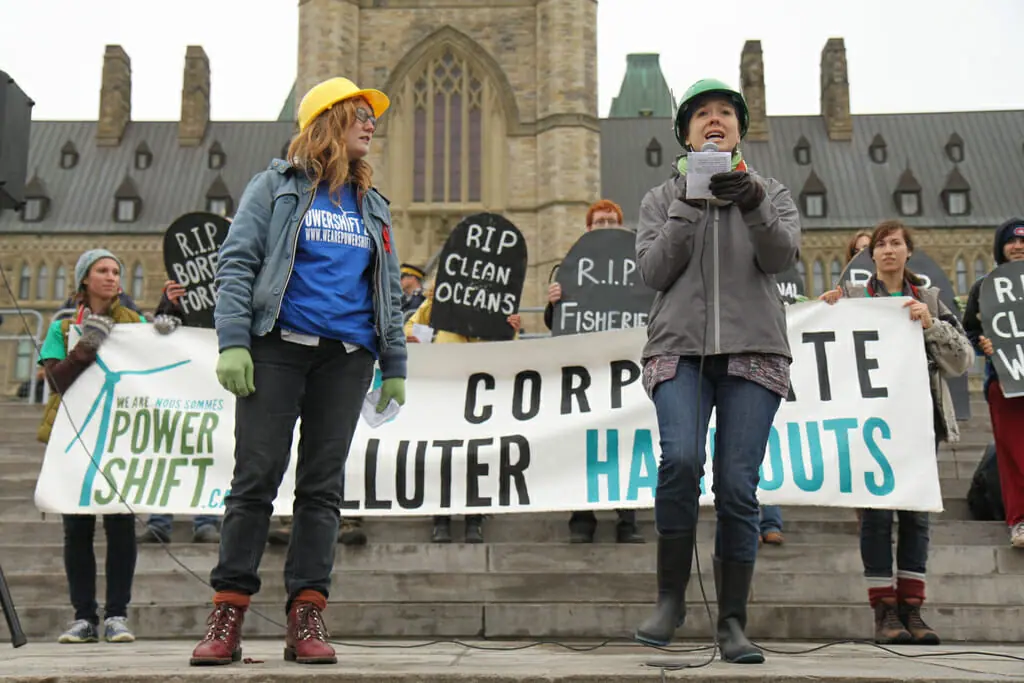Sophie Clark cranes her neck and looks back at a thousand people marching behind her. Dancing puppets and floating signs obscure her view, and she can’t see to the back. She can’t even see half way.
She waves a sign, her cold hands clawing its wooden shaft. Its message is the same as the driving goal of the PowerShift conference: demanding an end to the $1.4 billion in government fossil fuel subsidies.
More than a thousand passionate environmentalists convened in Ottawa over the weekend of Oct. 27 to figure out how that could be done. They spent two days learning different strategies, and on Monday, Oct. 29, they took what they learned to the streets.
“(A) huge sense of ‘I’m a part of something’ kicked in more than it had at any other part during the weekend, and that was pretty powerful and motivating,” says Clark. “(It’s) hopefully a microcosm for the larger community of people who actually care who just didn’t happen to be at PowerShift.”
The march was the culminating action of PowerShift, but by no means the only purpose.
Cameron Fenton, the director of the Canadian Youth Climate Coalition and one of the head organizers, describes it as “the cherry on what’s already been an amazing weekend.”
Strategic lobbying, endless workshops, and the march itself are integral parts of the program, he says, but “the most important part is the training, the connections … I feel like before PowerShift I referred to something called the youth climate movement in Canada, and now I actually believe it exists.”
************************
There were already four full blackboards when I arrived late at “We Are PowerShift,” the first workshop of the weekend. Words like “capitalism” and “carbon credits” were under headings like “root causes” and “fake solutions.”
It was Saturday morning, and attendance was mandatory. The two-hour session laid out the values of the conference, and “how to approach community and climate organizing in a way that is anti-oppressive, inclusive and strategic.”
The rhetoric of the workshop was consistent with that of the entire conference — anti-capitalism, anti-fossil fuels, and anti-Harper. The group of 20 students concluded their broad discussion by musing what could be done with the $1.4 billion given to the fossil fuel industry each year.
Sustainable infrastructure, organic farming, education; everyone had a different idea.
There were 87 workshops and panels on Saturday, and 95 on Sunday. Topics ranged from activism to communication, from campaigning to investigation. Zigzagging through the University of Ottawa halls between workshops was like buzzing through a hive.
After “We Are PowerShift,” I attended a panel on “the muzzling of scientists” or, how increasingly difficult it is for journalists to interview federal climate experts.
Alana Westwood, a Dalhousie biology PhD student, led the discussion. In preparation for the panel, she spoke to as many scientists as she could. None would go on record, and almost all of them had at least one story about their jobs being threatened for speaking to the media without supervision.
“It’s like the 1950s Soviet Union,” she said.
To speak to a scientist now, you now have to contact the media relations person at the department you want to speak to, says Westwood. They put the request through, and it is discussed amongst superiors in the department. Sometimes it goes all the way to the Prime Minister’s office. It takes at least two weeks, and sometimes there’s no response at all. When there is, she says, journalists are asked to submit a list of questions prior to the interview, and the scientist is given a suggested list of answers. If their answers differ from those given to them, they put their job at risk.
This is just one of issues discussed over the weekend. It is a single scale on the ravenous monster that PowerShift is trying to subdue.
Over the weekend, the lifeblood of the monster was debated. Most said capitalism. Naomi Klein said neo-liberalism. Many simply thought fossil fuel companies.
The only remedy mentioned was community.
************************
When I stepped on the rumbling bus outside of the SUB on Thursday night, the unfamiliar faces were disconcerting. I sat at the back. In the dim yellow light of the 30-person bus I could see clusters and pairs of people talking. I only recognized a few.
By the time we had left the march early to catch our bus home, unfamiliar faces were now fellow comrades. There were no clusters anymore, just a single unified group.
While still at the march, Sophie Clark’s green PowerShift t-shirt and shoddy mesh costume—built to look like a smog cloud—fit her perfectly in the mosaic Halloween imagery of the passionate demonstration.
“You’re amongst all these weird puppets of Stephen Harper and weird, weird stuff. You got a sense that you’re part of something really, really big.”
Clark wasn’t alone in the feeling. Cameron Fenton, after experiencing the demoralizing failure of international climate talks three years ago in Copenhagen, released extra force in his chanting. He says PowerShift, and the march, revitalized his optimism.
“I’ve always known there’s something there, but it’s been so long since we’ve had something like PowerShift in this country,” he says.
“We’re finally getting back to where I think a lot of us hoped we would be.”


Recent Comments